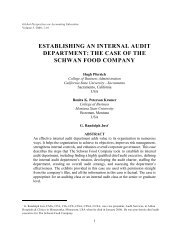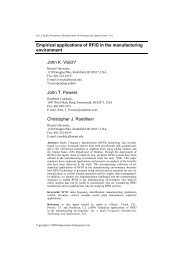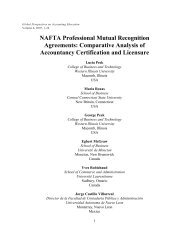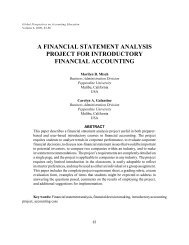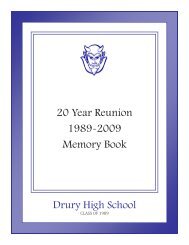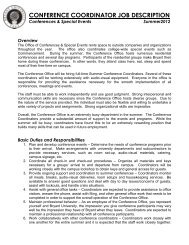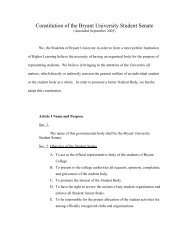Why use multiple-choice questions on accounting - Bryant
Why use multiple-choice questions on accounting - Bryant
Why use multiple-choice questions on accounting - Bryant
Create successful ePaper yourself
Turn your PDF publications into a flip-book with our unique Google optimized e-Paper software.
42 Simkin, Keuchler, Savage, and Stiverrelati<strong>on</strong>ship between the two test formats. Our analysis, using data that were drawn from tendifferent <strong>accounting</strong> classes, suggests that this relati<strong>on</strong>ship, while positive, appears to be relativelyweak. We are not al<strong>on</strong>e in this finding–a number of scholars performing parallel tests <strong>on</strong> otherstudent subjects and at other universities have reached the same c<strong>on</strong>clusi<strong>on</strong> in other disciplines(Becker and Johnst<strong>on</strong>, 1999; Dufresne et al., 2002; Kuechler and Simkin, 2003).This leads us back to the initial questi<strong>on</strong> posed in the title of this paper: “<str<strong>on</strong>g>Why</str<strong>on</strong>g> Use MultipleChoice Questi<strong>on</strong>s <strong>on</strong> Accounting Certificati<strong>on</strong> Examinati<strong>on</strong>s?” If the purpose of such examinati<strong>on</strong>sis to assess the professi<strong>on</strong>al qualificati<strong>on</strong>s of their test takers, we cannot defend their <str<strong>on</strong>g>use</str<strong>on</strong>g> andtherefore have no answer to this questi<strong>on</strong>.CaveatsIn our analyses, we recognize that a host of factors may have led us astray. For example, anystudy is likely to have some sampling error. Here, we discuss some additi<strong>on</strong>al possibilities. Oneproblem with any study using student participants is the possibility that its researchers have studiedthe wr<strong>on</strong>g populati<strong>on</strong>. We recognize this possibility, but are not sure it applies here. After all, mostcertificati<strong>on</strong> exams require their test takers to complete a four-year degree in <strong>accounting</strong> or a relatedfield at an accredited college–i.e., the test takers in the populati<strong>on</strong> from which our sample wasdrawn. N<strong>on</strong>etheless, sampling bias is still possible.Another possible explanati<strong>on</strong> for our lack of str<strong>on</strong>ger results is the likelihood that thedifferent test formats are not equivalent–i.e., the possibility that the MC <str<strong>on</strong>g>questi<strong>on</strong>s</str<strong>on</strong>g> and CR <str<strong>on</strong>g>questi<strong>on</strong>s</str<strong>on</strong>g>test different levels of knowledge and that such <str<strong>on</strong>g>questi<strong>on</strong>s</str<strong>on</strong>g> therefore require different skill sets oftheir test takers. We readily admit this possibility, and in fact embrace it. We do not want to provethat these test formats are different. We already believe that they are different. Rather, what wesought to find was a relati<strong>on</strong>ship between student performance <strong>on</strong> these two, very different typesof tests. If we had found a str<strong>on</strong>g c<strong>on</strong>necti<strong>on</strong>, we could then take comfort in the fact that certificati<strong>on</strong>tests, if carefully c<strong>on</strong>structed, can indeed rely solely <strong>on</strong> MC test formats to perform the assessmenttasks desired of them. Empirically, however, we were disappointed that we did not find a closerrelati<strong>on</strong>ship.We also note that we are all individuals, and that most people are more comfortable taking<strong>on</strong>e type of test than the other. Some students complain, for example, that a forthcoming test will<strong>on</strong>ly be <str<strong>on</strong>g>multiple</str<strong>on</strong>g> <str<strong>on</strong>g>choice</str<strong>on</strong>g>–a test format they feel they “d<strong>on</strong>’t do well with”–while others express theopposite preference. We acknowledge the possibility that our sample c<strong>on</strong>tained a prep<strong>on</strong>derance ofindividuals with <strong>on</strong>e dispositi<strong>on</strong> rather than the other–e.g., we happened to pick students who, say,liked MC tests. In such circumstances, the c<strong>on</strong>necti<strong>on</strong> between performance <strong>on</strong> MC and CR testswould be tenuous, leading to the results we did, in fact, observe here. Given our large sample andten classes, however, this possibility seems remote.A similar comment applies to the potential for an ordering bias in our study, ca<str<strong>on</strong>g>use</str<strong>on</strong>g>d by thefact that the student examinati<strong>on</strong>s <str<strong>on</strong>g>use</str<strong>on</strong>g>d in this study c<strong>on</strong>sistently placed the MC secti<strong>on</strong>s of the testsbefore the CR porti<strong>on</strong>s. At least two items mitigate this possibility. One is the fact that students werefree to answer the <str<strong>on</strong>g>questi<strong>on</strong>s</str<strong>on</strong>g> in any order, and all students were given enough time to finish all partsof their examinati<strong>on</strong>. The other, more important <strong>on</strong>e, is the fact that no students were asked to leavethe exam room before they had finished the entire test.We also recognize that certificati<strong>on</strong> examiners invest substantial resources in creating andvalidating their tests, and that the MC <str<strong>on</strong>g>questi<strong>on</strong>s</str<strong>on</strong>g> they c<strong>on</strong>tain are not necessarily equivalent to the<strong>on</strong>es we <str<strong>on</strong>g>use</str<strong>on</strong>g>d in our analyses. We certainly believe that carefully-worded MC <str<strong>on</strong>g>questi<strong>on</strong>s</str<strong>on</strong>g> are better


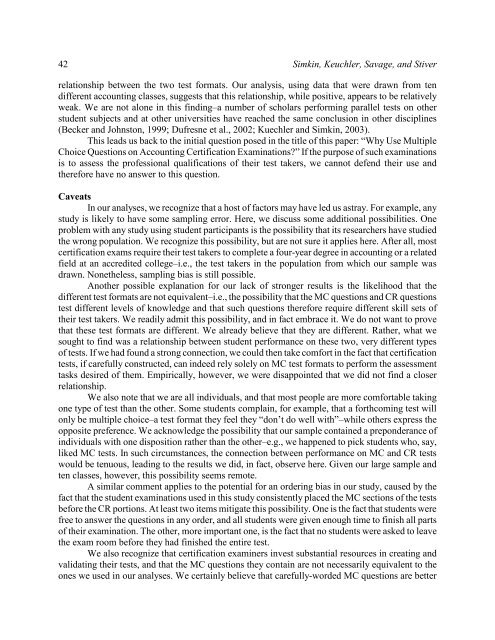
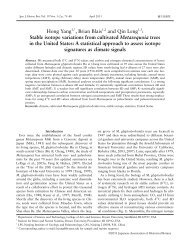
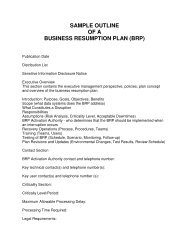
![[1] The Legal Environment of Business (LGLS211) Andrea Boggio ...](https://img.yumpu.com/45269009/1/190x245/1-the-legal-environment-of-business-lgls211-andrea-boggio-.jpg?quality=85)
